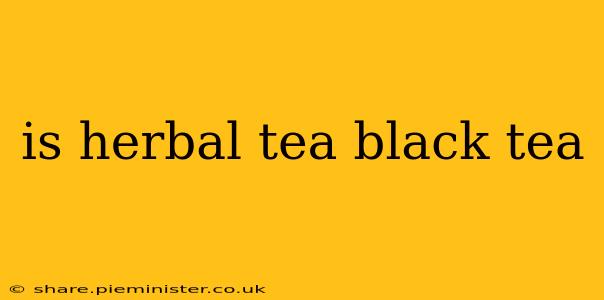The short answer is no, herbal tea is not black tea. While both are brewed and enjoyed as beverages, they come from entirely different sources and possess distinct characteristics. This article will delve into the differences between herbal tea and black tea, clarifying their origins, properties, and health benefits.
What is Black Tea?
Black tea originates from the Camellia sinensis plant. This is the same plant that produces green tea, white tea, and oolong tea. The difference lies in the processing: black tea undergoes full oxidation, resulting in its characteristic dark color, strong flavor, and robust caffeine content. The oxidation process changes the chemical composition of the leaves, leading to a different taste profile compared to other teas from the Camellia sinensis plant.
What is Herbal Tea (or Tisane)?
Herbal tea, also known as tisane, is not technically a "tea" in the botanical sense. It's an infusion made by steeping herbs, spices, fruits, or other plant materials in hot water. Crucially, it does not contain any leaves from the Camellia sinensis plant. This means herbal teas are naturally caffeine-free (or very low in caffeine), offering a gentler alternative to caffeinated beverages.
What are the Key Differences Between Herbal Tea and Black Tea?
Here's a table summarizing the key differences:
| Feature | Black Tea | Herbal Tea (Tisane) |
|---|---|---|
| Source | Camellia sinensis plant | Various herbs, spices, fruits, flowers, etc. |
| Caffeine | High | Generally caffeine-free |
| Oxidation | Fully oxidized | Not applicable |
| Flavor Profile | Strong, robust, often malty or earthy | Wide variety, depending on ingredients |
| Color | Dark brown/black | Varies widely depending on ingredients |
| Health Benefits | Varies, potential antioxidants, etc. | Varies widely depending on ingredients |
What are the Health Benefits of Black Tea?
Black tea contains antioxidants, particularly flavonoids, which are associated with various health benefits, including potential cardiovascular protection and improved brain function. However, it's important to note that more research is needed to confirm these benefits conclusively. High caffeine content can also be a factor for some individuals.
What are the Health Benefits of Herbal Tea?
The health benefits of herbal teas vary greatly depending on the ingredients. For example, chamomile tea is known for its calming properties, peppermint tea can aid digestion, and ginger tea can help soothe nausea. Always research the specific benefits of the herbal tea you choose to consume.
Does Herbal Tea Contain Caffeine?
Most herbal teas are naturally caffeine-free. However, some herbal tea blends may contain ingredients like guarana or yerba mate, which do contain caffeine. Always check the product label to confirm the caffeine content if you are sensitive to caffeine.
Can I Substitute Herbal Tea for Black Tea?
Whether you can substitute herbal tea for black tea depends entirely on your preference and the purpose. If you're looking for a caffeine-free alternative with a different flavor profile, then herbal tea is a perfect substitute. However, if you enjoy the robust taste and caffeine kick of black tea, then herbal tea won't provide the same experience.
In conclusion, herbal tea and black tea are distinct beverages with different origins, properties, and health benefits. Understanding these differences will help you make informed choices about your beverage consumption.
